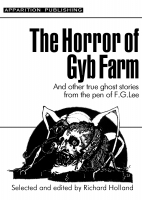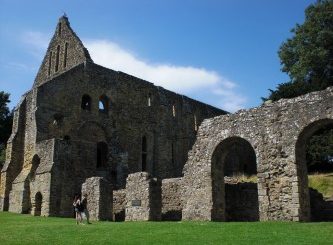Haunted Carpentry Shop, Plymouth
In his ‘The Haunted Homes and Family Traditions of Great Britain’ (1897), John Ingram gives the following account of the ghostly carpenters encountered by Mary Anne Hunn, probably around 1791. ‘Amongst the innumerable multitude of buildings which have the reputation of being haunted, it will be noted that by far the larger number are haunted by strange noises and mysterious sounds only, but few of them really attaining to the dignity of being visited by visible beings. Some of the places, however, which have had the character of being disturbed by unusual and unaccountable noises are very interesting from the suggestiveness of these noises: in the following account, for instance, and indeed in many others, the ghostly but invisible visitants appear to be condemned to return to the occupations they followed before they shuffled off the mortal coil, and to resume, after their incorporeal fashion, the labours of their past life.
The mother of the famous premier, George Canning*, after the death of her first husband, became an actress, and married an actor. Becoming a widow for the second time, she married a third husband, named Hunn, and under his name appears to have acted in the provinces. Among other provincial towns Mrs. Hunn visited Plymouth, but previous to her arrival there she had requested Mr. Bernard, who was in some way connected with the theatre there, to procure lodgings for her in the town. When Mrs. Hunn arrived, she was met by Mr. Bernard with the intimation that if she were not afraid of a ghost, he could obtain very comfortable lodgings for her at a very low rate, “for there is,” said he, “a house belonging to our carpenter that is reported to be haunted, and nobody will live in it. If you like to have it, you may, and for nothing, I believe, for he is so anxious to get a tenant; only you must not let it be known that you do not pay any rent for it.”
Mrs. Hunn, alluding to theatrical apparitions, said it would not be the first time she had had to do with a ghost, and that she was very willing to encounter this one; so she had her luggage taken into the house in question, and the bed prepared. At her usual hour, she sent her maid and her children to bed, and curious to see if there was any foundation for the rumour she had heard, she seated herself with a couple of candles and a book, to watch the event. Beneath the room she occupied was the carpenter’s workshop, which had two doors; the one which opened into the street was barred and bolted within; the other, a smaller one, opening into the passage, was only on the latch; and the house was, of course, closed for the night. She had read somewhat more than half an hour, when she perceived a noise issuing from this lower apartment, which sounded very much like the sawing of wood; presently, other such noises as usually proceed from a carpenter’s workshop were added, till, by-and-bye, there was a regular concert of knocking and hammering, and sawing and planing; the whole sounding like half a dozen busy men in full employment. Being a woman of considerable courage, Mrs. Hunn resolved, if possible, to penetrate the mystery; so, taking off her shoes, that her approach might not be heard, with her candle in her hand, she very softly opened her door and descended the stairs, the noise continuing as loud as ever, and evidently proceeding from the workshop, till she opened the door, when instantly all was silent all was still not a mouse was stirring; and the tools and the wood, and everything else, lay as they had been left by the workmen when they went away. Having examined every part of the place, and satisfied herself that there was nobody there, and that nobody could get into it, Mrs. Hunn ascended to her room again, beginning almost to doubt her own senses, and question with herself whether she had really heard the noise or not, when it re-commenced, and continued, without intermission, for about half an hour. She however went to bed, and the next day told nobody what had occurred, having determined to watch another night before mentioning the affair to anyone. As, however, this strange scene was acted over again, without her being able to discover the cause of it, she now mentioned the circumstance to the owner of the house and to her friend Mr. Bernard; and the former, who would not believe it, agreed to watch with her, which he did. The noise began as before, and he was so horror-struck that, instead of entering the workshop as she wished him to do, he rushed into the street. Mrs. Hunn continued to inhabit the house the whole summer, and when referring afterwards to the adventure, she observed that use was second nature; and that she was sure, if any night these ghostly carpenters had not pursued their visionary labours, she should have been quite frightened lest they should pay her a visit upstairs. ‘
*George Canning lived at 50 Berkeley Square between 1770 – 1827, a reputedly haunted house.
**Mary Anne Costello (Born 1747 – Died Henrietta Street, Bath, 10 March 1827) had three children with her husband George Canning Snr. Following his death she took to the stage and became the mistress of Samuel Reddish, an actor. One account suggests they had had five children. In 1778 George Canning’s family came to his financial aid and was taken in by guardians and was sent to a respectable school. Though he could write to mother, he was not allowed to see her as being on the stage was not seen as being acceptable and he did not see her again until 1786. In 1783 she married a draper from Plymouth, Richard Hunn, who she possibly had a further three children with.
Map Note: I do not know where in Plymouth this experience took place yet so the map shows a central location. I will update this map should more information become available.




Re: Haunted Carpentry Shop, Plymouth
The following is an earlier account the above experience and was published in ‘The Literary Gazette and Journal of Belles Lettres, Arts, Sciences etc For The Year 1830’
Of Mrs Hunn the sketch is no less original and interesting. 1791 ‘The lady that led our tragic business this summer at Plymouth was my old friend Mrs Reddish, formerly Mrs Canning and now Mrs Hunn. On the decease of her second husband the tragedian of Drury Lane, she had married a respectable merchant of Plymouth and retired from the stage, but the latter gentleman’s misfortunes in business threw her again on the profession as her only resource. As an actress the efforts of Mrs Hunn were more characterised by judgement than genius, but Nature had gifted her in several respects to sustain the matrons. As a friend and a companion she possessed all the intelligence with the accomplishment to be desired in a woman, surrounding her talents with the halo of her becoming principles. It was at all times in her domestic rather than her public character that Mrs Hunn secured the public admiration and met with a patronage which talent might not have obtained. I had peculiar opportunities of seeing this as well as of noting her great affection for her children. She had two little girls with her, the Miss Hunns and a son George Canning, then at Lincoln’s inn I believe, preparing for the bar. Upon the latter all her hopes rested, for the ultimate recompense of her struggles and disappointments, hopes that were singularly realised I had the pleasure of reading many of his letters to his mother, in which describing the progress of his studies and his prospects, the enthusiasm of genius was lost in the glow of filial tenderness his acquirements and his connexions he valued only as the means of enabling him to provide for a mother who in his person had made so many sacrifices to revive the character of his father. These letters were Mrs Hunn’s greatest treasures She read them going to bed and carried them in her bosom as amulets against the poison of care or despondency. But Mrs Hunn was not more distinguished by this maternal affection than a moral courage and a self possession which are the usual concomitants of sterner and colder dispositions. Upon this point I can give my reader a remarkable proof. Mrs Hunn on reaching Plymouth applied to me to aid her in procuring lodgings which she required to be on a respectable but economic scale. The only ones I knew of belonged to Symmonds our carpenter which were near the theatre and possessed many conveniences but some person reported that the house contained a already a perturbed and perambulating spirit other occupants it had latterly wanted. Symmonds therefore offered them to Mrs Hunn for a nominal rent if she would be the of putting to silence this unfounded and ruinous rumour. The latter was happy to them on such easy terms and said with a smile that it was not the first time she had concerned in the Haunted House the first evening of her entering these lodgings after her children were in bed and the was dismissed she resolved to sit up a hours to ascertain whether any sounds or were to be heard. What she anticipated this attempt I cannot say but it would been excusable in the wisest of either sex if the stillness of that time and the loneliness her situation a book and a pair of candles only companions the powers of the imagination received a stimulus to overthrow those the reason. The carpenter’s shop on ground floor comprehended the width of the house and was barred and bolted on the inside. As the workmen made their exit at night through a door which opened into the private passage leading to Mrs Hunn’s apartments this door was usually left on the latch. About half an hour after Mrs H sat down to her book, between eleven and twelve, she actually heard a low but quick noise in the room beneath as if some one had taken up an extra sized plane and chipped off the entire side of the carpenter’s bench. This was the sounding note to the diabolical chorus to follow, the noise ceased but soon recommenced and rose up with an accompaniment of all the tools in the shop, a loud and vigorous concert of machinery from the violoncello movement of the saw to the fife squeaking rasp of the file, kept in tune by the time beating thump of a heavy axe. It seemed as if all the deceased artificers of the district had assumed their places at the bench and were executing a piece of carpentry for his infernal majesty. Mrs Hunn no sooner received this auricular than she determined to have ocular evidence of the fact. Few women in such a situation would have been troubled with their sex’s common feeling or failing curiosity and fewer would have possessed the courage equally uncommon to have attempted its satisfaction Laying down her book and taking up a candle she opened the staircase door and listened the sounds were still audible and proceeding from the same quarter. Taking off her shoes to prevent the slightest alarm she lightly and cautiously descended the stairs and placed her hand upon the latch of the shop door. She assured me that at this moment she heard the sounds as distinctly as in her own apartment and felt convinced they were produced by human agency. In a second the latch was lifted the door thrust open and her head and candle thrust in when lo all was still and stationary not a tool was out of its place and not a carpenter to be seen spiritual or material. To be assured of the truth she even entered the shop walked round the benches and examined the fastenings of the doors and windows every thing appeared in order and security. She then returned to her room doubting the reality of her recollections when the sounds re commenced and continued for about half an hour till they ceased altogether she then retired to rest. The next morning her impressions of the above were seemingly so monstrous that she resolved to say nothing till the events of another night either set aside or confirmed them. Between eleven and twelve the same noises occurred and she repeated her experiment which resulted in the same manner. The next day the landlord and myself were fully acquainted with the matter and invited to partake in her conviction I was willing to take her word but the carpenter was not, he sat up with her the ensuing evening heard the sounds and when Mrs H prevailed on him to descend the stairs with her, he was so frightened that instead of entering the shop, he ran out of the front door. Mrs H was now given the apartments rent free and continued to reside in them throughout the summer, the noises occurred every night for about half an hour till at length they grew so familiar that she heard them with indifference. Habit she said to me is second nature. “Mr Bernard, if I didn’t hear the carpenters at work every night, I should begin to fear they were coming up stairs.” These are the facts of this truly singular circumstance, they occurred in the knowledge of a hundred persons besides myself, my reader upon this assurance may account for them as he pleases, all I wish or care to establish is the courageous character of Mrs Canning.’